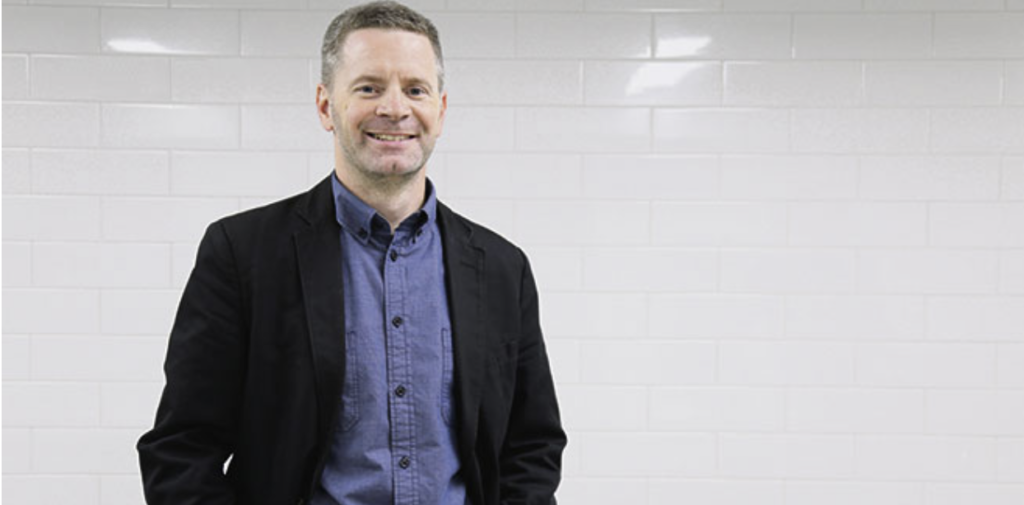CUA on Tap with Christopher West

Image Courtesy of The Catholic Leader
By Zachary Lichter
On Thursday, March 16, 2023, Christopher West, who is an author, speaker, and president of the Theology of the Body Institute, came to give an interactive talk about the theology of the body. The talk began with Patrick Hyland emceeing the event by leading everyone in prayer, then Michael Bellacicco introduced West to the stage by summarizing his career. West is known for his world-best-selling books, specifically St. John Paul II’s Theology of the Body. He is also known for his podcasts, specifically “Ask Christopher West,” which he co-hosts with his wife, Wendy.
West began his talk by telling a story by Italian theologian Father Luigi Giusanni about how he asked two young lovers, “Tell me, what does what you’re doing have to do with the stars?” The question Father Giusanni asked was what he wanted people to think about during the entire talk. West then asked everyone: what does sexual love have to do with the stars? When West meant the stars, he meant the infinite. West continued his talk by bringing up a PowerPoint on the projector with the first slide from Matthew’s Gospel “They look, but do not see” (Mt. 13:13). He asked everyone, “what is the difference between looking and seeing?” He then asked all of the women in the audience if they preferred for a man to look at them or see them. He asked the women, “what is the difference between looking and seeing?” West added that there is nothing wrong with being attracted to someone based on their looks, but he then mentioned that people should go deeper by looking deeper. He means that if people don’t look deeper, the body will be treated as “something.” However, if people see a person’s body, the body will be considered respected. People that see a person’s body will be considered to be seen again, more deeply, and as “someone.” The goal of “seeing” somebody through their physical appearance is to see them through their spirit.
West then pointed out that if people are just looking, they will rupture the body and the soul, which is a separation called death. He then said that being male or female can lead to the “great misery of being used.” The body would be treated as “something” because when people use someone else’s body, the person is being used. West then pointed out that if people do not “see,” the world is in crisis. Being seen creates misery for people that want to be loved. If people look at the world, then it is opaque. People only stare at the physical, and the physical is a sign of something spiritual. There could be something more spiritual and divine in that person that people don’t know about. When someone looks at someone else spiritually, there could be something that the person can see sacramentally.
West then noted that the body is biological when people are “looking,” and theological when people are “seeing.” West invited a boy up on stage and asked everyone to look at his body. He told everyone to look at the boy and asked if he was uncomfortable. It proved that humans are trained to “look” but not “see.” When a person looks at someone’s body but does not “see,” they are killing the other person, and it ruptures the body and the soul. When looking at somebody, they see somebody “made in the image and likeness of God.” There will never be another body of the same person through God’s glory.
West then asked if people knew where they got the word gender from. The word “gender” is not taken from the flesh because “gen” means to produce, and the ending word “der” matters when you generate new life. He then talks about when people tinker with their genitals, they produce new life. In Ephesians 5: 31-32, people learn that there is an enemy that doesn’t want people to know about human sexuality. West then went on to say that in Ephesians 6, there is a war on knowing what human sexuality is. The enemy is that no one wants to understand what your loins are. A person’s loins reveal the identity of a person’s gender.
West then said that every man is called to be a husband and a father. Every woman is called to be a wife and a mother. He then talked about Christian celibacy, which is when a man or a woman is dedicated to God the Father. A priest is called “Father” because he is married to the Church. Like Mother Teresa, a nun called “Mother,” is a woman married to God. Both a priest and a nun have many spiritual children. People have the choice to either be called to marriage of the body or marriage of the Church. Either way, God wants to marry us.
West then concluded that a woman’s body is Christmas on earth because it is a sign of heaven and earth. A woman’s pregnancy cycle is connected to the moon because of how the months are connected to the moon. Mary is the moon’s sign and a woman’s sign too. If a person can speak the truth about their bodies, they can talk about their bodies’ lives. He ended with everyone reading this quote “Confusion and meaningless reign when language gets scrambled, but when it’s set in order, things begin to make sense.”
Sophomore English and secondary education major Amanda Brotzman gave her comments afterward on Christopher West’s talk.
“I didn’t realize how explicit the bible was about sexuality and everything like that,” Brotzman said. “I mean obviously we know about Adam and Eve, but I really liked the way he explained it and how it’s connected to the New Testament like in Ephesians. I also really liked how he mentioned the bible route like a marriage.”
Sophomore mechanical engineering major, Michael Bellacicco gave his comments afterward on Christopher West’s talk.
“I really enjoyed his talk, especially because as college students we ought to know the beauty that can be found in our bodies and in ourselves as human persons and the Glory of God that we bring to our world,” Bellacicco said. “I think a lot of people don’t know that, so they end up being used or using, while in reality we are called to give up ourselves in a beautiful way which is like sacrifice and to recognize the beauty that we hold. So, I think his talk is important for everyone on campus to hear.”
CUA on Tap ended with a Q&A between people using the microphone and the QR code on every table due to the number of questions people had.





